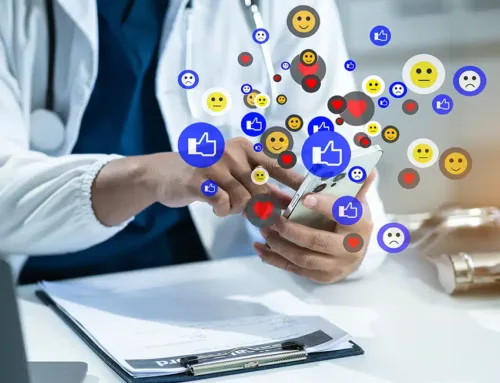Healthcare Social Media Marketing Strategies That Work
Discover how to master healthcare social media marketing and effectively connect with your audience in a highly regulated industry. This article cuts through the complexity, offering actionable strategies and best practices for creating engaging content, selecting the right platforms, navigating compliance, and building digital communities that resonate with today’s patients.
Key Takeaways
- Selecting the appropriate social media platforms and creating engaging content tailored to the target audience’s demographics and preferences are crucial for effective healthcare outreach.
- Healthcare organizations must navigate compliance and privacy concerns, adhering to regulations like HIPAA while utilizing social media to foster trust through authentic and transparent communication.
Harnessing Social Media for Healthcare Marketing Outreach
In the realm of healthcare marketing, social media has emerged as a powerful tool, akin to modern-day public squares fostering dialogue on health and wellness. Recognizing the significance of patient engagement and a strong digital presence, healthcare providers strategically employ targeted tactics to connect with potential patients and promote public health awareness across diverse social media channels.
By leveraging these platforms, healthcare professionals not only disseminate crucial healthcare information but also foster community interaction, cementing their roles as accessible and trusted figures within the online realm.
Identifying the Right Platforms
The digital communication landscape is multifaceted, and within the healthcare sector, not all social media platforms offer the same advantages. A savvy healthcare marketer must identify which platforms resonate most effectively with their desired demographic by considering factors such as age group preferences, interests, and typical online activities.
For engaging an older audience base, typically above 50 years old, Facebook stands out as a prime channel for sharing various health-related content, including wellness advice or recent medical studies. Conversely, Instagram’s emphasis on visual appeal attracts a younger crowd between 18 and 34 years old, making it an excellent venue for healthcare providers to disseminate engaging photos and stories that capture the attention of this specific target audience.
Crafting Engaging Content
The lifeblood of a thriving social media presence is captivating content, acting as the catalyst for stirring up discussions and maintaining active community involvement on these platforms. Healthcare marketers leverage educational content to raise awareness and impart knowledge about numerous healthcare subjects among patients.
Infographics simplify intricate health information into clear visuals, whereas videos and pictures breathe life into otherwise still medical advancements by crafting engaging stories. This not only boosts patient engagement but also propels the sharing of this content through various social media channels.
Measuring Engagement Success
Healthcare companies can gauge the success of their social media campaigns by looking beyond the content to consider metrics like engagement rate, click-through rate, and conversion rates. These indicators reveal how well a campaign connects with its intended audience. Through meticulous analysis of these data points, healthcare entities can tweak their approaches to bolster community involvement and enhance patient satisfaction, ensuring that their presence on social media is not only visible but also impactful.
Building Trust Through Authentic Communication
In the healthcare sector, establishing trust is paramount for any interaction between providers and patients. When healthcare organizations use social media channels to share authentic communications, they position themselves as trustworthy sources of information, essential in combating misinformation. Healthcare professionals can bridge a connection with their audience by sharing original content that provides insights into their expertise.
Such transparent messaging via social media does more than inform; it comforts the audience while simultaneously strengthening the bonds of patient engagement. This transparency helps reassure people seeking reliable health-related guidance and solidifies patient-provider relationships.
Addressing Patient Questions with Expertise
Healthcare professionals who interact on social media platforms establish a direct channel for communicating with both existing and prospective patients. Responding promptly and knowledgeably to patient inquiries on social media is crucial not just for imparting correct information, but also for demonstrating concern and fostering trust.
To ensure that the proficiency of healthcare staff is evident in every online engagement, thorough training in social media usage is essential. Such education underscores the institution’s dedication to delivering exceptional patient care and ensuring patient satisfaction.
Transparency in Healthcare Messaging
Engaging transparently on social media platforms, healthcare organizations signal their commitment to trustworthiness through candid conversations about treatment choices, services, and decisions related to patient care. This interactive engagement is not merely a tactic; it’s an expression of dedication to sincerity within the realm of healthcare social media that strongly resonates with patients and the broader community as they navigate the complexities of healthcare information.
Leveraging User-Generated Content for Community Building
Healthcare organizations tap into the powerful influence of patient voices in healthcare social media, fostering a sense of community. By sharing user-generated content such as personal narratives and testimonials with proper consent, they highlight the effectiveness of their healthcare services while emphasizing the human element inherent in patient care. These shared experiences promote a sense of recognition and mutual support among peers, significantly boosting both patient satisfaction and loyalty.
Celebrating Patient Journeys
Healthcare organizations utilize social media channels to celebrate the remarkable transformations of patients, showcasing the profound impact healthcare can have. By sharing these stories, they achieve more than simply recounting an event; they inspire and unite their audience.
By safeguarding privacy and maintaining confidentiality for those involved, such narratives of success weave a fabric of optimism that fosters a feeling of collective achievement throughout the local community.
Hosting Interactive Campaigns
Social media serves as a vital engagement platform for healthcare brands, encouraging patient involvement in their health journey through interactive campaigns. Utilizing cutting-edge features such as live streaming and polls, these healthcare organizations facilitate dynamic dialogues that enable patients to actively contribute to the narrative.
By inviting patients into volunteer roles or advisory groups, healthcare organizations strengthen connections with their audience, fostering a sense of community that extends beyond the online space. This approach builds an invested and supportive network around healthcare services.
Navigating Compliance and Privacy in Social Media
Healthcare organizations employ social media marketing strategies for healthcare while meticulously ensuring they adhere to the strictures of HIPAA and FDA guidelines. This delicate balance involves safeguarding patient privacy and upholding ethical practices within all forms of their digital outreach.
Creating a Compliant Posting Strategy
Healthcare organizations must constantly update their social media posting strategies to remain in harmony with the dynamic field of industry regulations. It is imperative for these entities to stay informed about new guidance from authorities such as the FTC and HHS, ensuring compliance across all forms of social engagement, including tweets, posts, and shares.
The foundation of an effective strategy rests on a thoroughly considered social media policy coupled with a stringent content approval procedure. These elements work together to forestall errors and ensure that marketing initiatives adhere strictly to premier norms regarding patient confidentiality and care.
Handling Sensitive Information
Healthcare organization must vigilantly monitor social media to quickly identify and respond to any incidents where sensitive healthcare information is shared inappropriately or potential privacy breaches occur. It’s crucial to maintain the trust that patients have in these institutions by ensuring the sanctity of their personal health information on online platforms.
Enhancing Patient Care with Digital Tools
In the digital era, social media has become a critical instrument for healthcare organizations to provide real-time communication and enhance patient care during a crisis. These platforms are leveraged by such entities to broadcast urgent updates, interact with the public amidst health emergencies, and maintain an informed and ready community.
Social Media in Crisis Response
During a health emergency, social media becomes an essential medium for prompt updates and reassurance. Patients and healthcare providers connect instantaneously to discuss issues and offer needed support. The COVID-19 pandemic highlighted the value of platforms such as Facebook in disseminating information. Organizations, including the World Health Organization, employed chatbots through these channels to effectively challenge falsehoods and reduce public worry.
Promoting Public Health Initiatives
Beyond crisis management, social media platforms offer healthcare organizations a powerful tool for championing ongoing public health initiatives and raising awareness. To strengthen their presence on social media, healthcare institutions can consider various strategies:
- Sharing reliable information through posted links.
- Actively engaging with online communities to educate and inform.
- Sharing inspiring stories and personal testimonials to highlight the importance of health initiatives.
- Hosting live sessions to address questions and concerns, fostering dialogue and understanding.
- Advocating for healthy practices and preventive actions through informative content.
Implementing these tactics allows healthcare entities to effectively combat misinformation while raising awareness about important health issues. Notably, successful public health campaigns have demonstrated how strategic social media posts can foster engagement and increase understanding of critical health issues, ranging from safety during extreme weather to promoting adolescent health, thereby fostering greater awareness within the community.
Optimizing Social Media for Healthcare Brand Promotion
In the highly competitive healthcare sector, establishing a strong social media presence is crucial for differentiation. Healthcare organizations must operate within intricate regulatory frameworks, diligently working to establish trust and demonstrate their proficiency. Adhering meticulously to guidelines from entities such as the FTC and HIPAA regulations, every piece of content shared or campaign launched needs to be carefully designed to elevate the brand’s reputation and effectively advertise its services.
Showcasing Healthcare Expertise
In today’s digital landscape, healthcare providers can effectively showcase their expertise, dedication, and achievements across social media platforms. Through the strategic integration of branding and direct response campaigns, often referred to as performance branding, these healthcare organizations can forge a compelling presence, engaging with patients at every step of their healthcare journey.
Managing Online Reputation
The online standing of a healthcare institution can be its most valuable resource or its weakest link. Healthcare marketers who track social media discourse and online critiques can understand how patients view their services and proactively address any issues.
Maintaining a uniform brand identity on various social media platforms is crucial as it keeps the healthcare entity top-of-mind for patients, builds trust, and promotes engagement.
Innovations in Healthcare Marketing via Social Channels
In the constantly evolving landscape of healthcare, organizations within this sector are adapting to new trends by revising their social media strategies. Healthcare marketers are increasingly embracing video content, prioritizing brand performance, and fostering candid conversations on delicate health issues as part of a modern approach.
Healthcare brands are also venturing into influencer marketing as an innovative avenue for communication. By leveraging influential personalities in society, they aim to strengthen their messaging about health matters and engage more deeply with their intended audience.
Embracing Emerging Social Features
In the rapidly evolving landscape of social media healthcare marketing, healthcare organizations must adopt new functions and trends to maintain a competitive edge. Those who make use of cutting-edge updates like Meta’s Reels or AI-driven advertising tools are more adept at connecting with patients and distributing compelling content.
It is crucial for these entities not merely to keep up-to-date but also to tailor their content strategies around these advanced features to develop a social media presence that truly speaks to patients and nurtures significant interaction.
Collaborating with Health Influencers
Healthcare organizations are broadening their communicative impact by partnering with health influencers, who are carving out fresh pathways for industry messaging. These collaborations not only amplify the companies’ presence but also infuse genuine credibility into their branding.
Both healthcare practitioners and patient champions contribute content that resonates on a personal level, effectively demystifying medical processes and presenting a more approachable face of the healthcare sector to digital audiences.
Summary
We’ve navigated the dynamic intersection of healthcare and social media, uncovering strategies that empower organizations to reach, engage, and educate patients like never before. The journey has revealed the importance of selecting the right platforms, crafting engaging content, and maintaining compliance, all while building trust and promoting public health initiatives. With these insights, healthcare organizations are poised to harness the full potential of social media, enhancing patient care and elevating their brand in the digital space.









